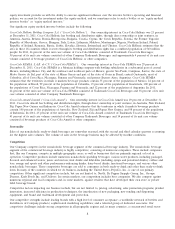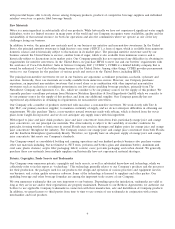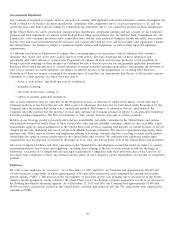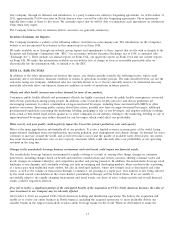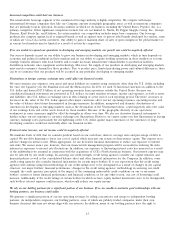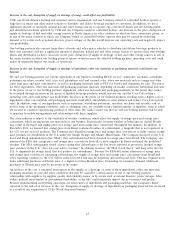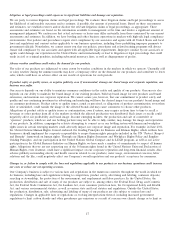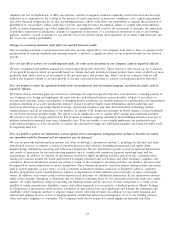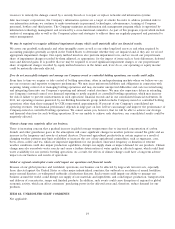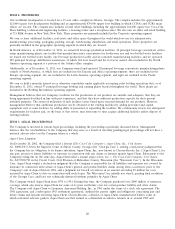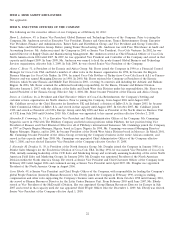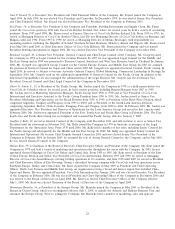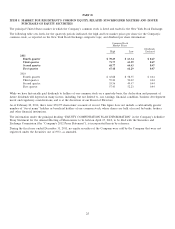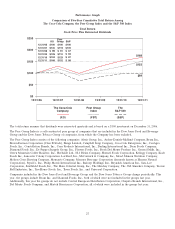Coca Cola 2011 Annual Report Download - page 20
Download and view the complete annual report
Please find page 20 of the 2011 Coca Cola annual report below. You can navigate through the pages in the report by either clicking on the pages listed below, or by using the keyword search tool below to find specific information within the annual report.eliminate the use of bisphenol-A, or BPA (an odorless, tasteless food-grade chemical commonly used in the food and beverage
industries as a component in the coating of the interior of cans), may result in increased compliance costs, capital expenditures
and other financial obligations for us and our bottling partners, which could affect our profitability or impede the production or
distribution of our products, which could affect our net operating revenues. In addition, failure to comply with environmental,
health or safety requirements and other applicable laws or regulations could result in the assessment of damages, the imposition
of penalties, suspension of production, changes to equipment or processes, or a cessation of operations at our or our bottling
partners’ facilities, as well as damage to our and the Coca-Cola system’s image and reputation, all of which could harm our and
the Coca-Cola system’s profitability.
Changes in accounting standards could affect our reported financial results.
New accounting standards or pronouncements that may become applicable to our Company from time to time, or changes in the
interpretation of existing standards and pronouncements, could have a significant effect on our reported results for the affected
periods.
If we are not able to achieve our overall long-term goals, the value of an investment in our Company could be negatively affected.
We have established and publicly announced certain long-term growth objectives. These objectives were based on our evaluation
of our growth prospects, which are generally based on volume and sales potential of many product types, some of which are more
profitable than others, and on an assessment of the potential price and product mix. There can be no assurance that we will
achieve the required volume or revenue growth or the mix of products necessary to achieve our long-term growth objectives.
If we are unable to realize the significant benefits from our productivity and reinvestment program, our financial results could be
negatively affected.
We believe that productivity gains are essential to achieving our long-term growth objectives and, therefore, a leading priority of
our Company is to design and implement the most effective and efficient business system possible. As part of our efforts to
become more efficient, leaner and adaptive to changing market conditions, we recently announced a productivity and reinvestment
program consisting of (i) a new productivity initiative focused on global supply chain optimization, global marketing and
innovation effectiveness, operating expense leverage, operational excellence and data and information technology systems
standardization; and (ii) an expansion of our initiative to capture CCR integration synergies in North America, focused primarily
on our North American product supply. We expect to incur significant costs to capture these savings and additional synergies.
We intend to invest the savings generated by this program to enhance ongoing systemwide brand-building initiatives and also to
mitigate potential incremental near-term commodity costs. If we are unable to successfully implement our productivity and
reinvestment program, or if we are unable to capture the anticipated savings and additional synergies, our financial results could
be negatively affected.
If we are unable to protect our information systems against service interruption, misappropriation of data or breaches of security,
our operations could be disrupted and our reputation may be damaged.
We rely on networks and information systems and other technology (‘‘information systems’’), including the Internet and third-
party hosted services, to support a variety of business processes and activities, including procurement and supply chain,
manufacturing, distribution, invoicing and collection of payments. We use information systems to process financial information
and results of operations for internal reporting purposes and to comply with regulatory financial reporting, legal and tax
requirements. In addition, we depend on information systems for digital marketing activities and electronic communications
among our locations around the world and between Company personnel and our bottlers and other customers, suppliers and
consumers. Because information systems are critical to many of the Company’s operating activities, our business processes may
be impacted by system shutdowns or service disruptions. These disruptions may be caused by failures during routine operations
such as system upgrades or user errors, as well as network or hardware failures, malicious or disruptive software, computer
hackers, geopolitical events, natural disasters, failures or impairments of telecommunications networks, or other catastrophic
events. In addition, such events could result in unauthorized disclosure of confidential information. If our information systems
suffer severe damage, disruption or shutdown and our business continuity plans do not effectively resolve the issues in a timely
manner, we could experience delays in reporting our financial results and we may lose revenue and profits as a result of our
inability to timely manufacture, distribute, invoice and collect payments for concentrate or finished products. Misuse, leakage
or falsification of information could result in a violation of data privacy laws and regulations and damage the reputation and
credibility of the Company and have a negative impact on net operating revenues. In addition, we may suffer financial and
reputational damage because of lost or misappropriated confidential information belonging to us or to our bottling partners,
other customers, suppliers or consumers. The Company could also be required to spend significant financial and other
18


